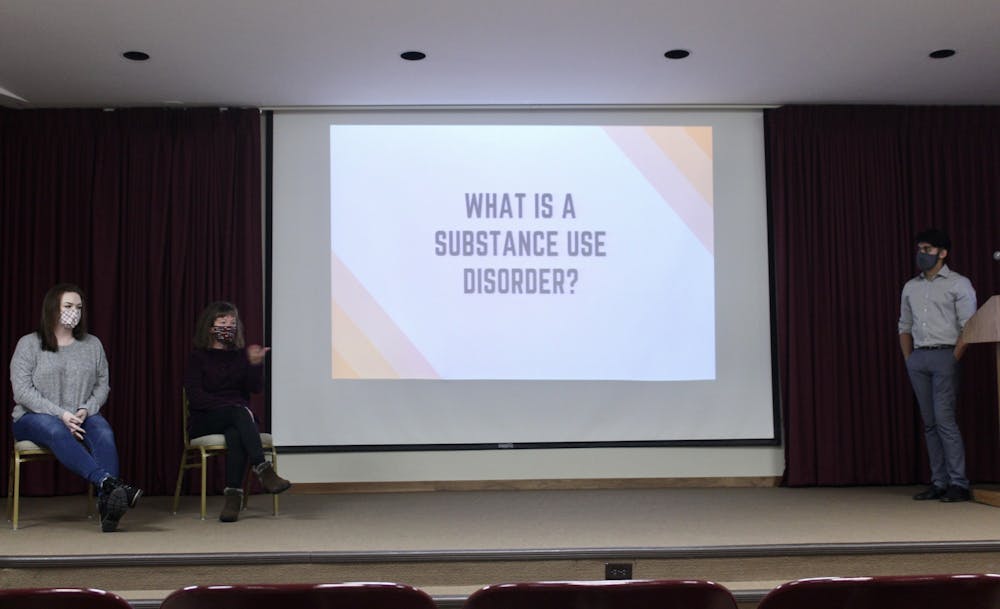SGA events spreads awareness for substance abuse, addiction

The Student Government Association hosted a “Speak Your Peace” event on Dec. 1 in the Bovee University Center Auditorium.
The event was open to all students to discuss the increase in addiction and relapse as a result of the pandemic.
Guest speakers, Monica Borle, 52, and her daughter Charlotte, 19, lead the event by talking about their personal experience working with those struggling with substance abuse.
Borle has been a registered nurse for 25 years. In the recent four years, she began to primarily focus more on substance abuse disorder and addiction medicine. She mainly practices in Maryland where she works for Access Carrol, an integrative healthcare organization that provides primary healthcare, dental services, psychiatry and an out-patient detox program to support those in need.
Charlotte took up her interest from working with her mother and interacting with patients. She is a sophomore at CMU pursuing pre-med and minoring in substance abuse education.
Due to the pandemic, there has been a 13 percent increase in addiction and substance abuse in Michigan. Nationally, there was an 18 percent increase since 2019.
Borle mentioned that this increase is due to the prolonged isolation which caused many people a lot of stress. In addition, she said other factors include economic stress and job loss, as well as the government stimulant checks. Many people that were struggling with addiction or with a possible relapse, would take advantage of this in order to supply themselves with what they could afford.
One of the biggest factors Borle discussed was the fact that everything went from face-to-face to virtual, including alcoholics anonymous and opioid abuse disorders meetings.
"Missing that one-on-one, that face-to-face interaction, was huge for them," Borle said. "It was absolutely critical.”
Borle mentioned the mandate of closures for all businesses besides grocery stores, where liquor stores remained open the entire time. Therefore, there was a gateway for many people to either relapse or start an addiction in order to cope with the overwhelming stress from COVID-19.
“They might’ve had three or four months in recovery and doing well,” Borle said. “Things went to heck in a handbasket. They said, 'Oh my gosh... I can’t handle this stress anymore. I’ve lost my job because of COVID and I don’t know how I’m going to pay the bills.' They started using (drugs) where they left off, and that was the problem because their body was no longer used to that dose, and they would overdose.”
One of the substances that Borle had touched on that emerged from the pandemic for the price of $3 is called scramble. She explained that this drug is highly dangerous considering dealers are putting anything inside of these pills, whether it is charcoal or lighter fluid, mixed with a random drug.
“It can be anything they want to put in it, and sell it to you for whatever you are asking for," Borle said. "You may be dead, they don’t care, they just don’t care."
Borle said for those who know someone struggling with an addiction, the best way to approach the situation is by asking, what’s going on and gently bringing the topic to the surface.
This technique is much preferred over blatantly confronting them, or telling them to stop. That way there is no judgement towards what they may no longer have control of. In many people’s cases, they need that substance to function normally so it is extremely hard to even begin the process of recovery. However, having support and guidance from loved ones goes a long way in assisting in recovery.
“If you feel like you need to go talk to someone, you should not be ashamed to go talk to someone about it, and just having open conversations about it,” Charlotte said.
Borle and Charlotte said they believe that there needs to be more awareness for addiction and substance abuse on campus. Currently, there is not a widespread conversation on campus about these issues, and a way to begin combating this is by talking about it.
“Awareness is huge, just having an open dialogue, an open conversation and having the resources available for someone to go talk to," Borle said. “Getting people to understand that, when you want to come in and talk to me about this, I can’t tell anyone about it. So, whatever you say to me, is safe.”






